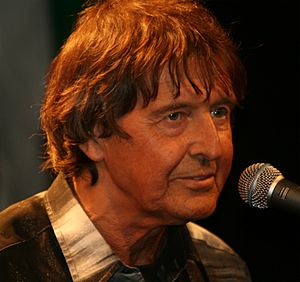Sverre Kjelsberg facts for kids
Quick facts for kids Sverre Kjelsberg |
|
|---|---|

Kjelsberg in 2009
|
|
| Background information | |
| Born | 18 October 1946 Tromsø, Norway |
| Died | 18 June 2016 (aged 69) Tromsø, Norway |
| Occupations | Singer, Guitarist, Bassist, Composer, Lyricist |
| Associated acts | The Pussycats |
Sverre Kjelsberg (born October 18, 1946 – died June 18, 2016) was a talented musician from Norway. He was a singer, played guitar and bass, and also wrote songs and lyrics.
Sverre Kjelsberg was a member of a band called The Pussycats starting in 1964. He became very well-known when he and Mattis Hætta represented Norway in the Eurovision Song Contest 1980. Their song was called Sámiid Ædnan. Sverre Kjelsberg wrote the music for this song, and Ragnar Olsen wrote the words.
Sverre Kjelsberg passed away in 2016 at the age of 69.
Contents
Music Career and Albums
Sverre Kjelsberg had a long and active career in music. He released several albums during his time as an artist. These albums showed his skills as a composer and lyricist.
Early Works and Collaborations
- Etter mørketia (MAI, 1979)
- Kära Syster (MAI, 1980): This album was made with Tage Löf, a Swedish pianist. It included some older songs from the 1700s by Carl Michael Bellman. It also featured the famous song Sámiid Ædnan.
- Låla! (MAI, 1980): This album featured traditional Sami yoik singing with Mattis Hætta.
Later Albums
- Sverre (Hot Line, 1982)
- Den glade pessimisten (OK, 1987): Sverre Kjelsberg worked with Ragnar Olsen on this album.
- Drømmen e fri (Nord-Norsk Plateselskap, 1994)
- Større kraft enn krutt (2005): This was a collection of his songs.
Eurovision Song Contest
The Eurovision Song Contest is a big international music competition. Countries from all over Europe send a singer or group to perform an original song. Sverre Kjelsberg and Mattis Hætta represented Norway in 1980.
The Song Sámiid Ædnan
Their song, Sámiid Ædnan, was special because it included traditional Sami yoik singing. Yoik is a unique form of music from the Sami people, who are native to parts of Norway, Sweden, Finland, and Russia. The song helped bring attention to Sami culture and rights. It became very popular in Norway.
See also
 In Spanish: Sverre Kjelsberg para niños
In Spanish: Sverre Kjelsberg para niños

